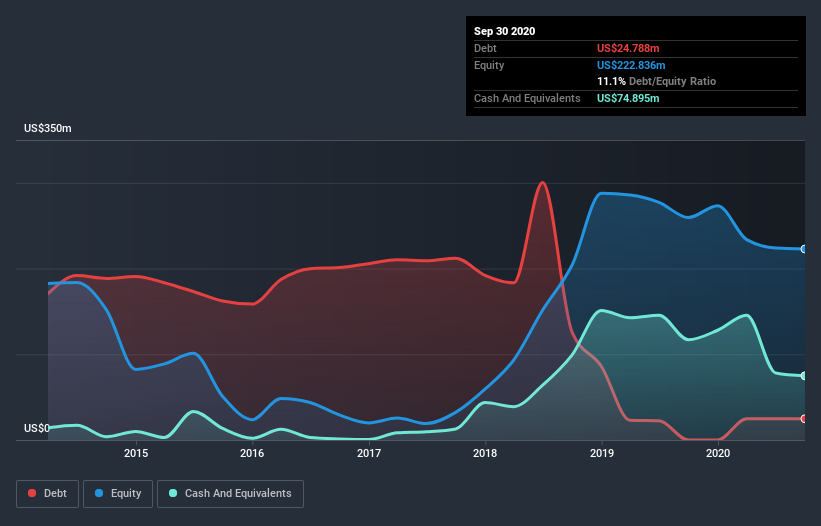Largo Resources (TSE:LGO) Seems To Use Debt Quite Sensibly
David Iben put it well when he said, 'Volatility is not a risk we care about. What we care about is avoiding the permanent loss of capital.' When we think about how risky a company is, we always like to look at its use of debt, since debt overload can lead to ruin. As with many other companies Largo Resources Ltd. (TSE:LGO) makes use of debt. But the real question is whether this debt is making the company risky.
Why Does Debt Bring Risk?
Generally speaking, debt only becomes a real problem when a company can't easily pay it off, either by raising capital or with its own cash flow. In the worst case scenario, a company can go bankrupt if it cannot pay its creditors. While that is not too common, we often do see indebted companies permanently diluting shareholders because lenders force them to raise capital at a distressed price. Having said that, the most common situation is where a company manages its debt reasonably well - and to its own advantage. The first thing to do when considering how much debt a business uses is to look at its cash and debt together.
See our latest analysis for Largo Resources
What Is Largo Resources's Net Debt?
The image below, which you can click on for greater detail, shows that at September 2020 Largo Resources had debt of US$24.8m, up from none in one year. However, its balance sheet shows it holds US$74.9m in cash, so it actually has US$50.1m net cash.
A Look At Largo Resources' Liabilities
The latest balance sheet data shows that Largo Resources had liabilities of US$43.4m due within a year, and liabilities of US$5.86m falling due after that. Offsetting these obligations, it had cash of US$74.9m as well as receivables valued at US$13.8m due within 12 months. So it can boast US$39.5m more liquid assets than total liabilities.
This surplus suggests that Largo Resources has a conservative balance sheet, and could probably eliminate its debt without much difficulty. Succinctly put, Largo Resources boasts net cash, so it's fair to say it does not have a heavy debt load!
It is just as well that Largo Resources's load is not too heavy, because its EBIT was down 88% over the last year. When it comes to paying off debt, falling earnings are no more useful than sugary sodas are for your health. There's no doubt that we learn most about debt from the balance sheet. But it is future earnings, more than anything, that will determine Largo Resources's ability to maintain a healthy balance sheet going forward. So if you want to see what the professionals think, you might find this free report on analyst profit forecasts to be interesting.
Finally, while the tax-man may adore accounting profits, lenders only accept cold hard cash. While Largo Resources has net cash on its balance sheet, it's still worth taking a look at its ability to convert earnings before interest and tax (EBIT) to free cash flow, to help us understand how quickly it is building (or eroding) that cash balance. Over the last three years, Largo Resources recorded free cash flow worth a fulsome 96% of its EBIT, which is stronger than we'd usually expect. That positions it well to pay down debt if desirable to do so.
Summing up
While it is always sensible to investigate a company's debt, in this case Largo Resources has US$50.1m in net cash and a decent-looking balance sheet. And it impressed us with free cash flow of -US$74m, being 96% of its EBIT. So we don't have any problem with Largo Resources's use of debt. The balance sheet is clearly the area to focus on when you are analysing debt. But ultimately, every company can contain risks that exist outside of the balance sheet. Case in point: We've spotted 2 warning signs for Largo Resources you should be aware of.
When all is said and done, sometimes its easier to focus on companies that don't even need debt. Readers can access a list of growth stocks with zero net debt 100% free, right now.
This article by Simply Wall St is general in nature. It does not constitute a recommendation to buy or sell any stock, and does not take account of your objectives, or your financial situation. We aim to bring you long-term focused analysis driven by fundamental data. Note that our analysis may not factor in the latest price-sensitive company announcements or qualitative material. Simply Wall St has no position in any stocks mentioned.
Have feedback on this article? Concerned about the content? Get in touch with us directly. Alternatively, email editorial-team (at) simplywallst.com.


